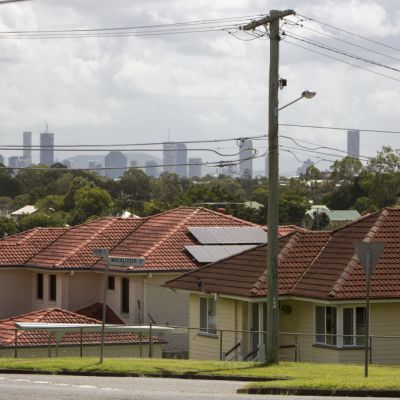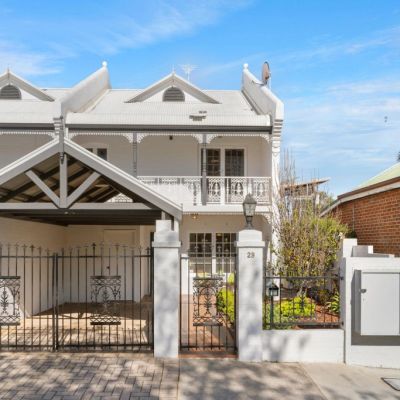Intergenerational housing wars: how your birth year dictates your property prospects
Boomers are sitting pretty, Millennials are compromising, Gen Z can’t even get a rental, and Gen X? Well, they could be in the most trouble of all.
Welcome to the intergenerational housing wars, a phenomenon that began years ago with “smashed avo-gate” and has since intensified as a new generation has come of age to crippling housing shortages, rolling interest-rate rises and a cost-of-living crisis.
Now that the Reserve Bank of Australia (RBA) has seen fit to hold interest rates at 4.1 per cent, and many economists are predicting that number to stay put for some time, there may be some relief on the horizon.
But for now, people are still dealing with the repercussions of this volatile economy, and how you’ve been affected can come down to your generation.
Baby Boomers
Born 1946-1964
Now in their 60s and 70s, the majority of Boomers own their home and have substantial cash savings, demographer Simon Kuestenmacher says.
“For cash savings, you want high interest rates,” he says. “Your pile of money grows without you doing anything – that is a dream come true; this is paradise on earth.”
According to Finder analysis of the home ownership pathways for each generation, Baby Boomers spent four times their average annual salary to pay off their homes, in comparison with all younger generations who face paying 11 times their income to do the same.

Finder home loans expert Richard Whitten says today’s home buyers spend much more of their incomes on housing costs than Boomers had to.
“While home buyers in the ’80s and early ’90s were hit with punishingly high interest rates, house prices were much lower,” he says.
“Buyers back then had to borrow less, save smaller deposits and spend less of their income on housing.”
Kuestenmacher says the theory behind the RBA’s recent series of rate rises is sound – as rates rise, discretionary spending is curbed and then inflation comes down.
“The only problem is that the demographic profile of Australia suggests we had the highest-spending decade we’ve ever had,” he says.
“Baby Boomers – they’re meant to be poor pensioners who don’t spend, historically speaking, but they’re not. They have tons of cash savings and they are not showing any signs of slowing down spending.
“The people who will stop spending are poor people and young people, so you create a societal conflict and intergenerational conflict.”
Domain chief of research and economics Dr Nicola Powell says once boomers sell or pass on properties to their kids, there will be more opportunities for younger people to buy homes in “really well-established, inner-city suburbs”.
“When the inheritance flows through, that transfer of wealth from Boomers to other generations is going to be huge,” Powell says.
Gen X
Born 1965-1979
Some of that wealth will go to this small generation, the Gen Xers, who are now in their 40s and 50s. And, when it does, it will help many of them to upsize to those highly sought-after suburbs, if they haven’t done so already, Powell says.
“When you’re in your 40s, you’ve got a couple of kids, you’re established in your career,” she says. “It’s going to be those upsizers into those, what I call “garden suburbs”, who are going to drive demand for housing.”

Belle Property principal Simon Harrison says upsizers boosted price growth through the pandemic.
“We had aspirational buyers say, ‘We can’t travel, so we want a bigger home with a pool and all those extras,’” he says.
Though Gen Xers are in the prime of their lives, Kuestanmacher warns they are also under more pressure than other generations, with kids, ailing parents and their own “upscaling” stage of life all taking a financial toll.
“If something goes wrong in that scenario where you have almost artificially inflated housing costs, you have teenagers or uni kids – they don’t even have to live with you to be expensive – and potentially parents; that is the cohort at risk of foreclosing on mortgages,” he says.
When it comes to the proportion of interest Xers pay, they are slightly worse off than both the younger and older cohorts, spending seven times their annual salary on interest, according to Finder.
The two younger adult generations’ interest charges are, on average, six times their pay, while Boomers pay just three times their annual income.
Millennials/Gen Y
Born 1980-1994
Now mostly in their 30s, with some even in their early 40s, this is the largest generation Australia has seen. They’re building on that, now being in the baby-having stage of life – particularly since the onset of the pandemic – Kuestenmacher says.
“The inner-city hipster apartments that they rented overwhelmingly became too small, and they were hunting for three or four-bedroom dwellings,” he says.
And those Millennials are forking out about 20 per cent more than their annual income to put down a deposit on those homes, compared with Boomers, who, on average, only needed 35 per cent of their take-home for a deposit, Finder data indicates.

Harrison says the Millennial demand for larger homes has put pressure on both the rental and sales markets and many are left priced out or settling for smaller homes than they would like.
“Some are saying, ‘Well, I want to be in that area, so I’ll go for a bigger townhome rather than a house,’” he says.
Compromises are also being made when this cohort is deciding how many children they should have, Kuestenmacher says.
“One bedroom for parents, one bedroom for each kid and, if you’re a knowledge worker, you now also need another small room with a door – a ‘Zoom room’ – to keep the kids and the cats out of your business calls,” he says
“If all that I can afford is a three-bedroom house, I can have one kid.”
Gen Z
Born 1995-2009
Though the youngest of this cohort are still in their mid-teens, the oldest are in their late 20s, establishing their careers and looking to their home-buying potential.
Kuestenmacher says though they are fortunate in part because they are a small generation with good job prospects thanks to low unemployment, their property options are another story.
“Housing costs, of course, for them are ridiculous,” he says. “Ultimately, they don’t see a way out. And that’s when we finally see as a country that what we need is systemic change.”
Finder’s data shows that Gen Zs would need to pay close to one-and-a-half times their average annual income to afford a 20 per cent deposit on a house.
“It’s understandable that some young Australians are simply giving up on the home-owning dream,” Whitten says. “Saving a deposit looks like an impossible goal, let alone handling loan repayments.”

Kuestenmacher says Gen Zs are likely to postpone having children even longer than Gen Xers and Millennials did, and they are also likely to rent for longer.
He says though renting long-term is not a problem, it becomes so once people retire and they are forced to spend their diminished retirement income on housing.
“The one important thing is that we get as many people as possible into their own house by retirement,” Kuestenmacher says. “We need to make sure we can grow old in this country.”
We recommend
States
Capital Cities
Capital Cities - Rentals
Popular Areas
Allhomes
More










